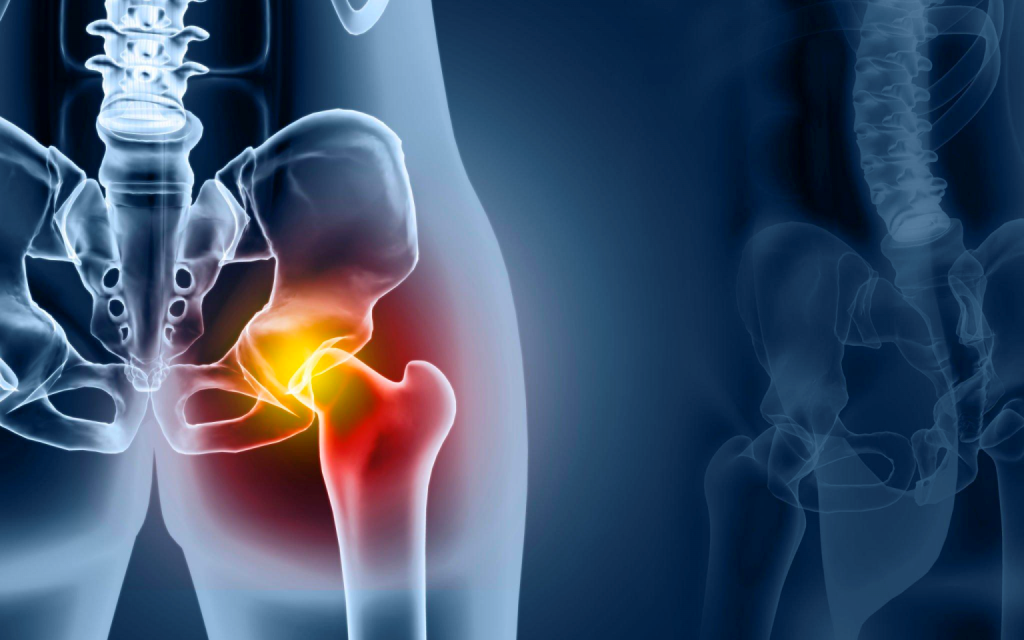Home » Hip replacement surgery cost in Chennai | Get no-cost EMI with GMoney

If you’re considering hip replacement surgery, you might have a lot of questions and concerns. It can be especially frustrating when you’re dealing with the pain of your condition and don’t have anyone to turn to for answers. But don’t worry – this blog can help you find the answers you’re looking for and guide you through the process of hip replacement surgery.
Inflammation of the hip joint caused by arthritis, avascular necrosis, or fractures can lead to degeneration and chronic pain.
Nonsurgical treatments, such as physical therapy, medication, and lifestyle adjustments, may provide temporary relief from pain, but the pain may return. Moreover, persistent pain can interfere with daily activities and make them difficult to perform.
Hip replacement surgery is recommended by osteologists and surgeons for such individuals. In some cases, total hip replacement surgery may be prescribed, involving the replacement of the entire joint with prosthetics.

Hip joint pain can come from a lot of different places.
Hip replacement surgery is a highly effective solution for relieving hip joint pain and improving the stability and connection between the bones of the hip joint. Many people worldwide report a significant reduction in pain after undergoing this procedure.
Hip replacement surgery is a major operation. It involves taking out a person’s damaged hip joint and replacing it with an artificial joint made from metal and plastic. The hip joint is a weight-bearing joint in the body that consists of the pelvic bone’s socket (acetabulum) and a rounded bone (femur head). The artificial joint is designed to move like a natural hip joint.
A surgeon performs total hip replacement surgery on a patient who is asleep from the effects of general anesthesia. The person usually stays in the hospital for several days or weeks after the surgery.
Hip replacement surgery typically leads to a significant reduction in pain and an enhancement of the patient’s quality of life. The surgery often restores the patient’s ability to walk, run, and climb stairs. Additionally, some patients may also experience improved stability, balance, and posture.

Increased Quality of Life: Hip replacement surgery has a number of advantages that significantly enhance patients’ quality of life. After surgery, many patients claim to feel stronger, more active, and more independent. Moreover, they benefit from a greater range of motion and reduced discomfort. Patients frequently stand and balance better as well.
Mobility Gains: Individuals who have hip replacement surgery also get greater mobility. As a result of their improved mobility and less pain and suffering, they are better able to move around freely and more easily, making it easier for them to carry out activities of daily living like running, walking, and climbing stairs. They can also engage in sports like biking and swimming that may have been difficult before the procedure.
Decreased Pain and Discomfort: Hip replacement surgery also provides relief from the pain and discomfort brought on by the ailment. The pressure on the nearby muscles, tendons, and ligaments is reduced by the replacement hip joint, which also lessens stiffness and discomfort. Also, because the new hip joint is often more stable, patients can move with assurance and comfort.
Improved Confidence: Hip replacement surgery can also help patients feel more confident about themselves. Patients who have had joint replacement surgery can now pursue activities they may have shunned before surgery with confidence because they have a robust and durable joint. This boosted self-assurance can result in a more contented life when combined with regular upkeep and maintenance.

Depending on the city, the price could be vastly different for the same procedure. Do your research ahead of time and find out which cities offer the best deals on hip replacement surgery.
If you reside in Chennai and plan to undergo the procedure in the same city, the cost of hip replacement surgery in Chennai may range from Rs. 90,000 to Rs. 5,00,000.
Cost of the surgery in other metro cities of India
City
Price Range (Min-Max)
Ahmedabad
Rs. 7000 – Rs. 6,50,000
Bangalore
Rs. 55,000 – Rs. 7,00,000
Chandigarh
Rs. 3,00,000 – Rs. 5,00,000
Chennai
Rs. 90,000 – Rs. 5,00,000
Gurgaon
Rs. 30,000 – Rs. 5,00,000
Hyderabad
Rs. 70,000 – Rs. 8,00,000
Kolkata
Rs. 30,000 – Rs. 5,00,000
Mumbai
Rs. 47,000 – Rs. 8,00,000
New Delhi
Rs. 35,000 – Rs. 8,00,000
Noida
Rs. 70,000 – Rs. 3,00,000
Pune
Rs. 60,000 – Rs. 8,00,000
Hip replacement surgery in India can be expensive, costing between ₹1,50,000 and ₹2,50,000. This cost may be too high for some patients to afford. Additionally, post-operative care and rehabilitation expenses can add up quickly.
Despite the costs, many patients find that the benefits of the procedure outweigh the expenses. Many report a significant improvement in their quality of life after surgery. GMoney offers no-cost EMI medical loans for hip replacement surgery to help make this procedure affordable for those in need.

1. What is hip replacement surgery?
Hip replacement surgery is a medical procedure that involves replacing a damaged or worn hip joint with a prosthetic hip joint. This procedure is typically recommended for patients who have severe hip pain or stiffness that does not respond to other treatments.
2. What are the risks associated with hip replacement surgery?
While hip replacement surgery is generally safe when performed by a qualified and experienced surgeon, there are some risks to be aware of before deciding to undergo the procedure. Potential risks include infection, blood clots, dislocation, and nerve damage.
3. Is there a way to finance hip replacement surgery?
Yes. GMoney offers medical loans for hip replacement surgery that come with no-cost EMI and flexible repayment options, so you can pay without stressing about your budget.
4. What are the advantages of hip replacement surgery?
Hip replacement surgery can lead to improved mobility and quality of life for patients. It can also help relieve chronic pain and stiffness in the hip joint.
5. How much time does it take to recover after hip replacement surgery?
The recovery period for hip replacement surgery can vary, depending on the individual’s age, overall health, and the type of procedure performed. Generally, most patients can expect to return to their normal activities within two to three months after the surgery.
Hip replacement surgery can be a big decision with a lot of potential consequences, both positive and negative. On the plus side, it can offer pain relief, improved mobility, and a better quality of life. But there are also some drawbacks to think about, like recovery time and the possibility of complications. Another thing to consider is the risk of delaying surgery and the long-term effects of living with untreated hip pain.
Disclaimer: THIS WEBSITE DOES NOT PROVIDE MEDICAL ADVICE.
Follow us
Reach us
Mumbai HO
GMoney Pvt. Ltd.
315, 215 Atrium,
Next to Courtyard by Marriott,,
A.K. Road, Andheri East,
Mumbai - 400093
Ph : +91 86570 00105, +91 72089 60444
Quick Links
Bengaluru
GMoney Technologies Pvt. Ltd.
Oyo Work Spaces, Umiya Emporium,
Opposite Forum Mall, Hosur Rd,
Koramangala, Bengaluru,
Karnataka 560029
Ph : +91 72089 60444
Delhi
GMoney Technologies Pvt. Ltd.
Berry Co Works, 1E/3,
Jhandewalan extension,
Next to jhandewalan metro station
gate no. 2 Barakhambha Road,
New Delhi, Delhi 110001
Ph : +91 72089 60444
Pune
GMoney Technologies Pvt. Ltd.
91 Spring Board, Sky Loft,
Creaticity Mall, Off, Airport Rd,
opposite Golf Course, Shastrinagar,
Yerawada, Pune,
Maharashtra 411006
Ph : +91 72089 60444
Chandigarh
GMoney Technologies Pvt. Ltd.
SCO no. 292,
First Floor, Sector 35D,
Chandigarh
Ph : +91 72089 60444
Jaipur
GMoney Pvt. Ltd.
CODESKK Civil Tower,121 122,
Pandit TN Mishra Marg,
Santhosh Nagar, Nirman Nagar,
Jaipur – 302019
Ahmedabad
GMoney Pvt. Ltd.
22nd Floor, B Block,
Westgate By True Value,
Nr. YMCA Club, SG Highway,
Ahmedabad – 380051
Hyderabad
GMoney Pvt. Ltd.
Dwaraka Pride,
Plot no. 4/1, Survey No. 64,
Huda Techno Enclave, Madhapur,
Hyderabad (Telangana) – 500081
Chennai
GMoney Pvt. Ltd.
DBS Business Center, 31A,
Cathedral Garden Rd, Badrikari, Tirumurthy Nagar, Nungambakkam, Chennai, Tamil
Nadu – 600 034
Mumbai HO
GMoney Pvt. Ltd.
315, 215 Atrium,
Next to Courtyard by Marriott,,
A.K. Road, Andheri East,
Mumbai - 400093
Ph : +91 86570 00105, +91 72089 60444
Bengaluru
GMoney Pvt. Ltd.
3rd floor, Ranka Junction,
AH45, Krishna Reddy Industrial Estate,
Dooravani Nagar,
Bengaluru Karnataka - 560016
Ph : +91 72089 60444
Pune
GMoney Pvt. Ltd.
91 Spring Board, Sky Loft,
Creaticity Mall, Airport Rd,
Opp. Golf Course, Shastrinagar,
Yerawada, Pune,
Maharashtra - 411006
Ph : +91 72089 60444
Delhi
GMoney Pvt. Ltd.
Berry Co Works, 1E/3,
Jhandewalan extension,
Gate no. 2 Barakhambha Road,
New Delhi, Delhi - 110001
Ph :
+91 72089 60444
Chandigarh
GMoney Pvt. Ltd.
SCO No. 292,
First Floor, Sector 35D,
Chandigarh - 160022
Ph : +91 72089 60444
Hyderabad
GMoney Pvt. Ltd.
Dwaraka Pride,
Plot no. 4/1, Survey No. 64,
Huda Techno Enclave, Madhapur,
Hyderabad (Telangana) - 500081
Jaipur
GMoney Pvt. Ltd.
CODESKK Civil Tower,121 122,
Pandit TN Mishra Marg,
Santhosh Nagar, Nirman Nagar,
Jaipur - 302019
Chennai
GMoney Pvt. Ltd.
DBS Business Center, 31A,
Cathedral Garden Rd, Badrikari,
Tirumurthy Nagar,Nungambakkam, Chennai,
Tamil
Nadu - 600 034
Pune | Mumbai | New Delhi | Kolkata | Chennai | Navi Mumbai| Bengaluru | Ahmedabad | Nagpur | Hyderabad | Jaipur | Lucknow | Bhopal | Bhubaneswar | Nashik | Indore | Ghaziabad | Kanpur | Amritsar | Vasai | Noida | Gurugram | Chandigarh | Ranchi | Cuttack | Thane | Kalyan | Jalandhar | Kolhapur | Visakhapatnam | Chakan| Greater Noida | Wagholi | Raipur | Panvel | Belgaum | Mohali | Bhiwandi | Talegaon | Coimbatore | Palghar | Mumbra | Sangli | Surat | Durgapur | Ludhiana | Kochi | Agra | Ahmednagar | Ajmer | Akola | Aurangabad | Baroda | Beed | Rewari | Patiala | Vellore | Ranjangaon | Nanded | Nellore | Panipat | Panjim | Madurai | Mysore | Mangalore | Korba | Mathura | Kalaburagi | Jalgaon | Kharar | Guwahati | Kollam | Jamshedpur | Gwalior | Saswad | Solapur | Varanasi | Salem | Sambalpur | Jodhpur | Hubli | Panchkula | Faridabad | Amravati | Ayodhya | Badlapur | Dehradun | Parbhani | Ujjain | Udaipur | Tiruchirappalli | Srinagar | Shimla | Secunderabad | Ratnagiri | Pandharpur | Ananthapuram | Buldhana | Hadapsar | Baramati | Chittoor | Darjeeling | Dhule | Fatehpur | Gandhinagar | Haridwar | Gorakhpur | Jhansi | Kanchipuram | Kartarpur | Kurukshetra | Pondicherry | Prayagraj | Bharuch | Bhusawal | Bathinda | Pathankot | Nandurbar | Niphad | Kolar | Ambala | Kota | Pendurthi | Jabalpur | Palwal | Bhilai | Bhiwani | Bilaspur | Patna | Rohtak | Phagwara | Malegaon | Vijayawada | Bikaner | Chiplun | Darbhanga | Roorkee | Bhor | Rajahmundry | Margao | Alwar | Dhanbad | Bulandshahr | Aluva | Mulshi | Davanagere | Kapurthala | Anantapur | Loni | Latur | Gondia | Chhindwara | Chandrapur | Dharmapuri-TN | Faridkot | Dharwad | Daund | Chaksu | Bareilly | Kakinada | Haldwani | Doddaballapur | Dindori-MH | Bagru | Kudus | Kozhikode | Gurdaspur | Bokaro | Berhampur | Batala | Barrackpore | Ramgarh | Meerut | Bassi | Dera Bassi | Howrah | Karjat Raigarh | Thiruvananthapuram | Bheemunipatnam | Ambegoan | Allahabad | Aligarh | Alappuzha | Tirupathi | Thoppumpady | Srikakulam | Siliguri | Rourkela | Mirzapur | Gadag | Bellary | Tumkur | Sonipat | Hoshangabad | Junnar | Jalna | Hisar | Karnal | Kottayam | Muzzafarnagar | Ramnagara | Thrissur | Bahadurgarh | Balasore | Baraut | Dhar | Ernakulam | Gadhinglaj | Chikodi | Vaniyambadi | Kamothe |